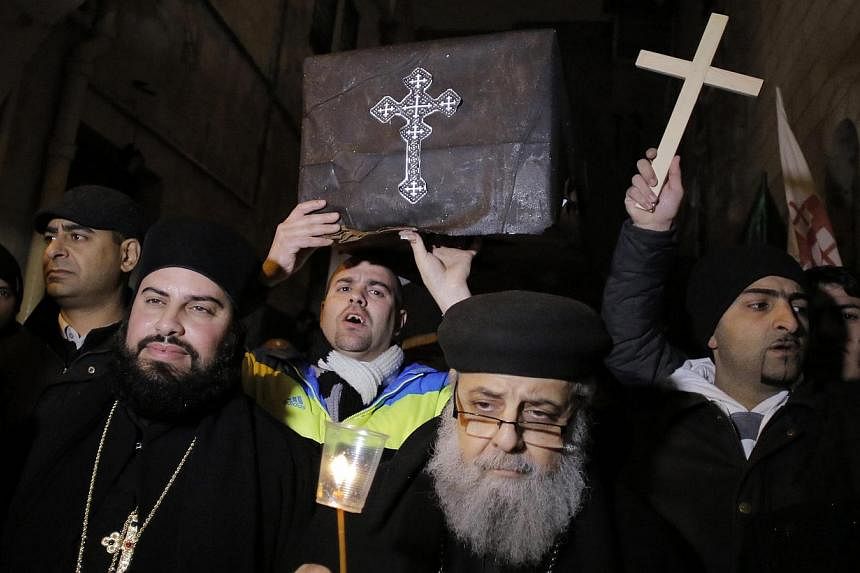Last weekend's ritualised slaughter of Egyptian Coptic Christian migrant workers in Libya by masked militants adhering to the Islamic State in Iraq and Syria (ISIS) was bestial, even by the hideous standards of the militant group.
Only a twisted mind would see it differently, yet this desecration of human beings was anything but mindless - the epithet politicians and commentators so often use to describe acts of terror.
Like many ISIS atrocities, this was a calculated provocation. The methods of the militant blackshirts are chillingly savage. But ISIS is chillingly smart too. It is already clear it has been trying to open up fissures and faultlines in Lebanon, Turkey, Jordan and Saudi Arabia, fragile states bordering the self-declared caliphate in the failed states of Iraq and Syria.
We have seen, too, how ISIS is starting to expand - especially across North Africa. In Egypt's ungoverned Sinai peninsula, the militants of Ansar Beit al-Maqdis - responsible for a string of bloody attacks on security forces - have declared themselves the Sinai Province of ISIS. In Libya, polarised and fragmented by civil war as the West and its Arab allies focus on Syria and Iraq, ISIS has crept into the vacuum to assert its presence in a new arena.
The "caliphate", intent on emulating the extraordinary success of early Islam as it burst out of Arabia, needs to keep adding to its territory.
But ISIS also makes clear it is eagerly awaiting the arrival of the "Crusader" forces it is trying to lure into its lairs. And for that purpose its massacres serve as what 19th-century anarchists knew as the "propaganda of the deed", the most spectacular example of which was Al-Qaeda flying airliners into New York's Twin Towers on Sept 11, 2001.
By now there should not be too much mystery about the militant dialectic. It was set out in a primer, written before Sept 11 but excerpted in the Arabic press shortly after it, by Ayman al- Zawahiri - Al-Qaeda's strategist then and the late Osama bin Laden's successor as head of Al-Qaeda now. If the United States were adequately provoked, he reasoned, it would almost certainly respond with large-scale reprisals, and "personally wage the battle against the Muslims", seeding the ground for a "clear-cut jihad against the infidels".
As a strategy it resembles Newton's third law of motion. Osama was explicit about this after his network blew up US embassies in Nairobi and Dar es Salaam in 1998: "As I said," he told an American interviewer, "every action elicits a similar reaction." The ISIS dynamic is equally clear: action-reaction-more action - ideally indiscriminate enough to radicalise Muslims and make its caliphate a magnet, while drawing in the infidel.
ISIS traces its origins to the Sunni insurgency ignited by the US-led invasion of Iraq in 2003, and specifically to the Iraqi branch of Al-Qaeda led by the sanguinary Jordanian militant Abu Musab al-Zarqawi. It broke with Al-Qaeda and Zawahiri in part because it believes he has forgotten his own teachings. But it is playing the same game; it wants to provoke not just a reaction but an overreaction.
It will presumably have discounted in advance the Egyptian air strikes on its Libyan followers, and will be looking for something of more incendiary propaganda value.
In the Egypt of President Abdel Fattah al-Sisi, the former army chief whose 2013 coup deposed the elected Islamist government of the Muslim Brotherhood, ISIS would welcome two developments.
Mr Sisi's government has banned the Brotherhood as a terrorist group, shot down hundreds of its supporters in the streets and jailed thousands. Hundreds of jailed Brothers have been condemned to death in what can only be described as kangaroo courts. If Egypt were to hang some of those convicted - as Jordan executed militants after ISIS burnt alive Muath al-Kasaesbeh, the pilot it captured - that would suit the ISIS playbook.
So too would further evidence that the US and Europe are closing ranks behind Mr Sisi, their misgivings about his coup and criminalisation of mainstream Islamism dispelled by the ISIS menace.
In militant eyes, all this would validate the ISIS thesis that democracy and elections are not only an affront to God's law but also useless, since the West and its autocrat allies in the region set a low priority on democracy for Arabs.
ISIS wants to spread jihad and convince a sufficiently big minority of Muslims that it is the only way. If it is eventually to be destroyed, it would be fatal to underestimate its gory guile.
FINANCIAL TIMES

